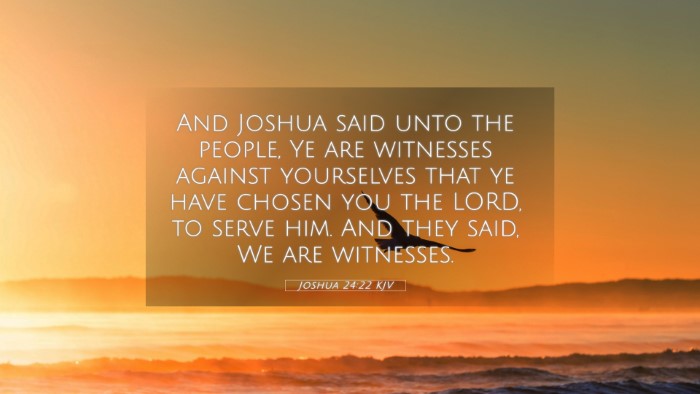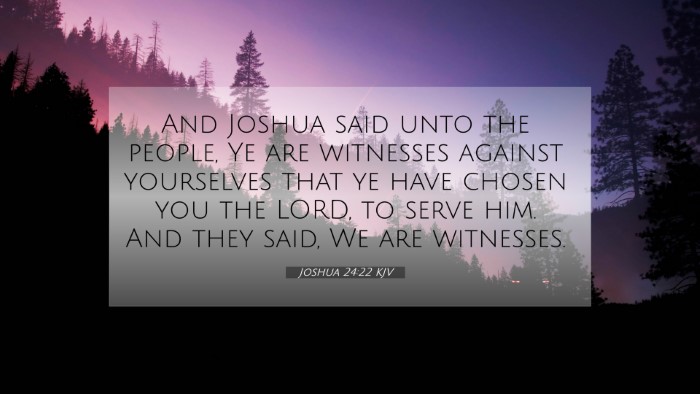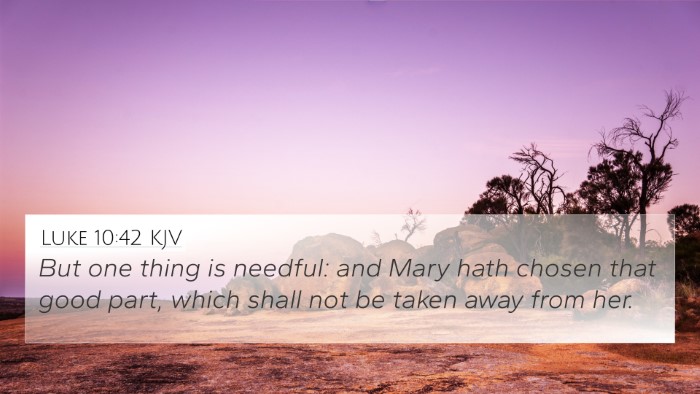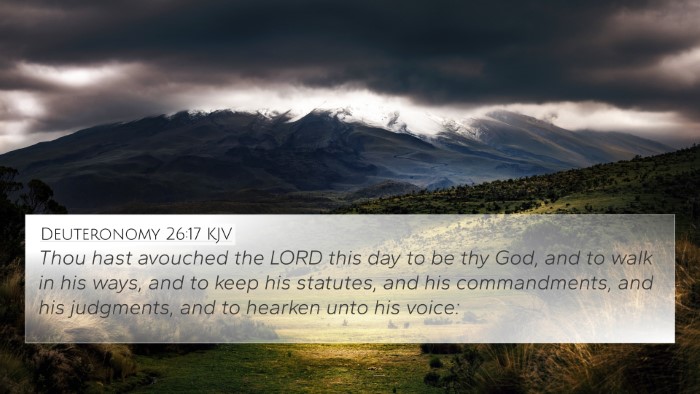Understanding Joshua 24:22
Joshua 24:22 states: "And Joshua said unto the people, Ye are witnesses against yourselves that ye have chosen you the Lord, to serve him." This verse encapsulates a pivotal moment in Israel’s history, emphasizing the accountability of the people in their covenant relationship with God. Here’s a comprehensive analysis of the verse's meaning, drawing insights from various public domain commentaries.
Contextual Overview
In the final chapters of the Book of Joshua, the people of Israel are urged to reaffirm their commitment to serve Yahweh. Joshua gathers the tribes at Shechem, reminding them of God's faithfulness and the blessings they have received in their conquest of Canaan. This particular verse highlights the people’s conscious decision to choose God over other options.
Commentary Insights
-
Matthew Henry: Henry comments on this verse by underlining the importance of public commitment in one’s faith. He emphasizes that the act of witnessing against oneself signifies accountability before God, suggesting that the children of Israel are now bound by their own declaration to serve the Lord.
-
Albert Barnes: Barnes focuses on the concept of the people as witnesses to their own choice. He remarks that their recognition of God as their choice reflects a transformative commitment that goes beyond mere verbal affirmation; it is a commitment of the heart and soul.
-
Adam Clarke: Clarke expounds on the significance of the phrase "witnesses against yourselves," indicating that this expression conveys a deep moral duty. It emphasizes that their choice will be a central part of their identity as a nation and their future actions will reflect this covenant choice.
Thematic Connections
This verse lays the foundation for several thematic connections throughout the Bible, particularly regarding choice, commitment, and accountability in faith. Here are notable aspects to consider:
- Covenantal Faithfulness: This verse ties into the broader biblical narrative concerning God’s covenant with Israel. It reminds us of other covenant moments, such as Exodus 19:5 and Deuteronomy 30:19.
- Public Confession: Aligns with Romans 10:9-10 where public acknowledgment of Christ is crucial to salvation.
- Choice in Serving God: Reflected in 1 Kings 18:21, where Elijah challenges the people to choose whom they will serve.
- Accountability: Similar to Galatians 6:5, emphasizing personal responsibility in one’s spiritual journey.
- Faith and Works: This choice corresponds with James 2:17, where faith without works is dead, showcasing the need for active service.
- Witnessing: Mirrors Acts 1:8, emphasizing the call to be witnesses of Christ in the world.
- Individual Responsibility: Compared to Ezekiel 18:30-32, which encourages personal repentance and responsibility.
Cross-Referenced Verses
The following verses can be cross-referenced with Joshua 24:22 to deepen understanding and thematic connections:
- Exodus 19:5: God calls Israel to be a treasured possession.
- Deuteronomy 30:19: The choice between life and death is set before the people.
- Romans 10:9-10: Confession of faith leading to salvation.
- James 2:17: Faith must be accompanied by action.
- 1 Kings 18:21: A challenge to choose between the Lord and Baal.
- Galatians 6:5: Each person will bear their own load.
- Acts 1:8: The call to be witnesses of Christ in all the earth.
- Ezekiel 18:30-32: Encouragement to repent and turn from sin.
Conclusion
Joshua 24:22 encapsulates the essence of personal and communal commitment to God. As the Israelites bear witness to their choice, modern readers are reminded of the importance of taking responsibility for their faith and actions. By engaging in comparative Bible verse analysis and understanding cross-referenced themes, one can appreciate the depth of biblical teachings on choice, accountability, and service to God.
Tools for Further Study
For those interested in exploring further, the following tools and methods are beneficial for effective Bible study:
- Bible Concordance: A valuable resource to locate verses related to specific keywords.
- Bible Cross-Reference Guide: Helpful in identifying parallel passages in Scripture.
- Cross-Reference Bible Study Methods: Techniques to engage with interconnected texts.
By utilizing these resources, believers can deepen their understanding of biblical themes and enhance their spiritual journey through thorough study and reflection.








